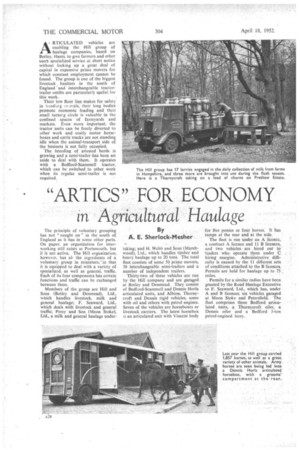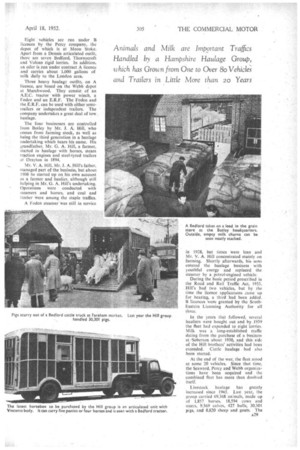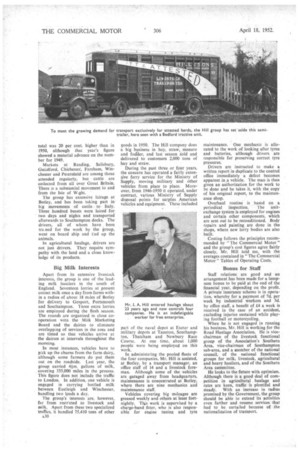"ARTICS" FOR ECONOMY
Page 30

Page 31

Page 32

If you've noticed an error in this article please click here to report it so we can fix it.
in Agricultural Haulage By A. E. Sherlock-Mesher A• RTICULATED vehicles arc enabling the Hill group of haulage companies, based on Batley, Hants, to give farmers and other users specialized service at short notice without locking up a great deal of capital in expensive prime movers for which constant employment cannot be found. The group is one of the biggest livestock , hauliers in the south of England and interchangeable tractortrailer outfits are particularly u,seful for
this work. . . Their low floor line makes for safety in hindlirg ar,mals, their long bodies promote economic leading and their small turnirg circle is valuable in the confined spaces of farmyards and markets. Even more important, the tractor .units can he freely diverted to other work and . costly motor horseboxes and cattle trucks are not standing idle when the animal-transport side of the business is not fully occupied.
The breeding of attested herds is growing and a semi-trailer .has been set aside to deal with them.. It operates with a Bedford-Scamniell tractor, which can be switched to other work when its regular semi-trailer is not required., The principle of voluntary grouping has not "caught on" in the south of England as it has in some other parts. On paper, an organization for interworking still exists at Portsmouth, but if is not active. The Hill organization, however, has al the ingredients of a voluntary group in miniature,in that it is equipped to deal with a variety of specialized, as well as general, traffic. Each of its four components has certain functions and traffic can be exchanged between them.
Members of the group are Hill and Sons (Botley and Denmead), Ltd., which handles livestock, milk and general haulage; F. Seaward, Ltd., which deals with livestock and general traffic; Percy and Son (Mean Stoke), Ltd., a milk and general haulage under taking; and H. Webb and Sons (March
wood), Ltd., which handles timber and heavy haulage up to 20 tons. The total fleet consists of some 50 prime movers, 30 interchangeable serni-trailers and a number of independent trailers.
Thirty-two of these vehicles are run by the Hill company and are garaged, at Botley and Denrnead. They consist of Bedford-Scammell and Dennis Horla articulated units, and Albion, Thornycroft and Dennis rigid vehicles, some with oil and others with petrol engines. Seven of the vehicles are horseboxes or livestock carriers. The latest horsebox LS an articulated unit with Vincent body
for five ponies or four horses. It has ramps at the rear and at the side.
The fleet is run under an A licence, a contract A licence and 11 B licences, and two vehicles are hired out to traders who operate them under C . hiring margins. Administrative difficulty is caused by the 11 different sets of conditions attached to the B licences. Permits are held for haulage up to 75 miles.
Permits for a similar radius have been granted by the Road Haulage Executive to F. Seaward, Ltd., which has, under A and ft licences, six vehicles garaged at Meon Stoke and Petersfield, The fleet comprises three Bedford articulated units, a Thornycroft oiler, a Dennis oiler and a Bedford 5-ton petrol-engined lorry. Eight vehicles are run under B licences by the Percy company, the depot of which is at Meon Stoke. Apart from a Dennis articulated outfit, there are seven Bedford, Thornycroft and Vulcan rigid lorries. In addition, an oiler is run under contract A licence and carries about 1,000 gallons of milk daily to the London area.
Three heavy haulage outfits, on A licence, are based on the Webb depot at Marchwood. They consist of an A.E.C. tractor with power winch, a Foden and an E.R.F. The Foden and the E.R.F. can be used with either semitrailers or independent trailers. The company undertakes a great deal of tow haulage.
The four businesses are controlled from Botley by Mr. J. A. Hill, who comes from farming stock, as well as being the third generation in a haulage undertaking which bears his name. His grandfather, Mr. G. A. Hill, a farmer, started in haulage with horses, steam traction engines and steel-tyrcd trailers at Drayton in 1894.
Mr. V. A. Hill. Mr. J. A. Hill's father, managed part of the business, but about 1908 he started up on his own account as a farmer and haulier, although "still helping in !VD. G. A. Hill's undertaking. Operations were conducted with steamers and horses, and coal and timber Were among the staple traffics.
A Foden steamer" was still in service
in 1928, but times were lean and Mr. V. A. Hill concentrated Mainly on fanning. Shortly afterwards, his sons entered the haulage business with youthful energy and replaced the steamer by a petrol-engined vehicle.
During the basic period prescribed in the Road and Rail Traffic Act, 1933, Hill's had two vehicles, but by the time the licence applications came 'up for hearing, a third had been added.
B licences were granted by the SouthEastern Licensing Authority for all three.
In the years that followed, several hauliers were bought out and by 1939 the fleet had expanded to eight lorries. Milk was a long-established traffic dating from the purchase of a business at ,Soberton about 1930, and this side of the Hill brothers' activities had been extended. Cattle haulage had also been started.
At the end of the war, the fleet stood at some 20 vehicles. Since that time. the Seaward, Percy and Webb organizations have been acquired and the combined fleet has more than doubled itself.
Livestock haulage has greatly increased since 1945. Last year, the group carried 69,368 animals, made up of 1,857 horses, 18,594 cows and steers, 9,369 calves, 427 bulls, 30,301 pigs, and 8,820 sheep and goats. The total was 20 per cent. higher than in 1950, although that year's figure showed a material advance on the number for 1949.
Markets at Reading, Salisbury, Guiidford, Chichester, Fareham, Wincheater and Peterstield are among those attended regularly, but cattle are collected from all over Great Britain. There Is a substantial movement to and from the Isle of Wight.
The group has extensive lairage at Botley, and has been taking part in big movements of cattle r to . Italy. Three hundred beasts were laired for two days and nights and transported afterwards to Southampton docks. The drivers, all of whom have , been tra.ned for the work by ehe group, went on board ship and tied up the animals.
In agricultural haulage, drivers are not just drivers. They require sympathy with the land and a close knowledge of its products.
Big Milk Interests
Apart from its extensive livestock interests, the group is one of the leading milk hauiiers in the south of England. Seventeen lorries at present collect milk once a day from farms within a radius of about 18 miles of Botley for delivery to Gosport, Portsmouth and Southampton. Three extra lorries are employed during the flush season: The rounds are organized in close cooperation witn the Milk Marketing Board and the dairies to eliminate overlapping of services in the area and are timed so that vehicles arrive at the dairies at intervals throughout the morning-.
In most instances, vehicles have to Pick up the churns from the farm dairy, although sonic farmers do -put them out on the roadside. Last year, the group carried 4i-rn. gallons of milk, covering 335,000 miles in the process. This figure does not include the traffic to London. In addition, one vehicle is engaged in carrying bottled milk between Eastleigh and Winchester, handling two !pads a day.
The group's interests are, however, far from restricted to livestock and milk. Apart from these two specialized traffics, it handled 75,410 tons of other e30 goods in 1950. The Hill company does a big business in hay, straw, manure and fodder, and last season iold and delivered to customers 2,000 tons of hay and straw.
During the past three or four years, the concern has operated a fairly extensive ferry service for the Ministry of Supply, moving military and other vehicles from place to place. Moreover, from 1946-1950 it operated, under contract, various Ministry of Supply disposal points for surplus American vehicles and equipment. These included part of the naval depot at Exeter and military depots at Taunton, Southampton, Thatcham and Newbury Race Course. At one time, about 1,000 people were being employed on this work.
In administering the pooled fleets of the four companies, Mr. Hill is assisted, at Batley, by a transport manager, an office staff of 14 and a livestock foreman. Although some of the vehicles are garaged away from headquarters, maintenance is concentrated at Batley, where there are nine mechanics and maintenance staff.
Vehicles covering big mileages are greased weekly and others at least fortnightly. This work is supervised by a charge-hand fitter, who is also responsible for engine tunine and tyre maintenance. One mechanic is allocated to the work of looking after tyres and batteries, although drivers are responsible for preserving correct tyre pressures.
Drivers are instructed to make a written report in duplicate to the control office immediately a defect becomes apparent in a vehicle. The man is then given an authorization for the work to be done and he takes it, with the copy of his original report, to the maintenance shop.
Overhaul routine is based on a periodical inspection. The unitexchange system is employed for engines and certain other components, which are sent out to be reconditioned. Body repairs and painting are done in the shops, where new lorry bodies are also built.
Costing follows the principles recommended by The Commercial Motor" and the group's cost figures agree fairly closely, Mr. Hill told me, with the averages contained in "The Commercial Motor" Tables of Operating Costs.
Bonus for Staff Staff relations are good and an arrangement has been made for a lumpsum bonus to be paid at the end of the financial year, depending on the profit. A private insurance scheme is in operation, whereby for a payment of 7d. per week by industrial workers and 5d. by office staff, a benefit of £4 a week is received in the case of an accident, excluding injuries sustained while playing football or motorcycling.
When he is not engaged in running his business, Mr. Hill is working for the Road Haulage Association. He is vicechairman of the livestock functional group of the Association's Southern Area, vice-chairman of Southampton sub-area, and a member of the national council, of the national functional groups for milk, livestock, agricultural and heavy hauliers, and of the Southern Area committee.
He looks to the future with optimism. Although there is a good deal of competition in agricultural haulage and rates are keen, traffic is plentiful and steady. With an increase in radius promised by the Government, the group should be able to extend its activities even farther and resume services that had to be curtailed because of the nationalization of transport.












































































